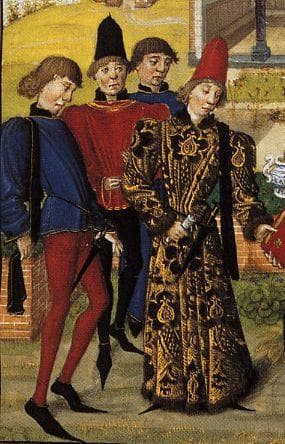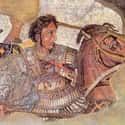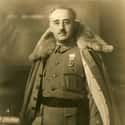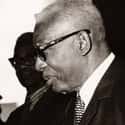-
(#1) Mao Zedong
- Dec. at 83 (1893-1976)
The leader of Chinese Communism was not devoted to personal hygiene as doggedly as he was to his revolution. He refused to bathe (opting instead to have his attendants swab him with hot towels) and preferred to rinse his mouth with tea rather than brush his teeth. This led to the development of abscesses and tooth decay.
Cavities were one of many ailments that plagued Mao Zedong. Stress seemed to trigger insomnia, and he suffered a series of heart attacks in the final years of his life.
Mao tried to keep his deteriorating health a secret in order to maintain his grip on authority. In 1974, doctors diagnosed him with amyotrophic lateral sclerosis (ALS). His muscle weakness worsened, and he lost the ability to speak coherently before he passed two years later.
-
(#2) Fidel Castro
- 92
Born in 1926, the Cuban revolutionary turned Communist leader generally enjoyed good health for most of his life. However, by 2007, at the age of 80, Castro came down with a serious case of diverticulitis, or intestinal inflammation.
Though relatively common in elderly adults, diverticulitis can be incredibly painful and can lead to fatal complications. Castro had multiple operations for diverticulitis that year, with one failed surgery requiring five months of recovery while his brother Raúl took the reins of government.
Castro's health issues became so severe he retired in 2008 and passed eight years later.
-
(#3) Chiang Kai-shek
- Dec. at 88 (1887-1975)
When in his 70s, Chiang Kai-shek - the iron-fisted nationalist leader of the Republic of China - developed urinary problems. Though he had surgeries for the issue in the 1960s, they left him incontinent, or unable to control his bladder.
Chiang's incontinence was so bad biographer Jay Taylor reports "he began a routine of remaining seated at the conclusion of meetings until everyone - except his aides - had departed," lest anyone notice his urine-soaked pants.
Chiang's struggles with incontinence ended only with his demise in 1975.
-
(#4) Julius Caesar
- Dec. at 56 (99 BC-43 BC)
Roman general-turned-dictator Gaius Julius Caesar was one of the most gifted military minds of the ancient world - and he battled an unknown ailment later in life.
Roman biographer Suetonius claimed Caesar "was subject to sudden fainting fits and disturbances in his sleep. He was likewise twice seized with the 'falling sickness,' while engaged in active service." Plutarch, another ancient writer, believed Caesar's health issues started cropping up in 46 BCE when he was 54.
What caused these issues remains contested. Many historians suspect Caesar had epilepsy, but recent scholarship suggests he suffered from strokes.
According to Plutarch, Casear's ailment - whatever it was - didn't impact his work:
He never allowed his weakened health to slow him down but instead used the life of a soldier as therapy. He marched endlessly, ate simple food, slept outside, and endured every hardship. In this way, he strengthened his body against illness.
The only things that brought Caesar down were the knives of his assassins: he was slain on the floor of the Roman Senate on March 15, 44 BCE.
-
(#5) Joseph Stalin
- Dec. at 75 (1878-1953)
Joseph Stalin's health began to decline in 1945, after he had what historians believe were strokes or heart attacks. His mental state also deteriorated, and he became more and more paranoid. The so-called Doctors' Plot - when he accused a group of doctors, many of whom were Jewish, of trying to eliminate Soviet officials - crystallized his paranoia and anti-Semitism.
There may have been a medical reason for his worsening mental state. The doctor who tended to Stalin shortly before his passing in 1953 claims the Soviet dictator suffered from atherosclerosis, or a hardening of his brain arteries. Stalin had probably suffered from it for years.
In his memoirs, the doctor alleged, "It is easy to imagine that in Stalin it caused him to lose the ability to distinguish between what was good and bad and who is a friend and who is an enemy."
-
(#6) Adolf Hitler
- Dec. at 56 (1889-1945)
Adolf Hitler's physical health has been at the center of historical debates for years. Though many suspect he had a host of ailments, one in particular could have had a tangible impact on WWII.
Researchers estimate Hitler suffered from Parkinson's Disease from around 1933, when he became dictator in Germany. His frequent hand tremors could have been a sign of the disease.
The degenerative affliction of the nervous system often has an associated cognitive impact. According to one study, researchers argue Parkinson's could have led Hitler to make poor military decisions, such as his unsuccessful incursion of Soviet Russia or the poor defense on the beaches of Normandy.
-
(#7) Henry VIII of England
- Dec. at 56 (1491-1547)
Athletic and well-educated, King Henry VIII was the golden boy of England in his youth. But by middle age, he became overweight, overbearing, and downright bloody-minded. He ordered the slaying of two of his six wives and thousands of other people.
What happened to the golden prince? In 1536, Henry had a serious jousting mishap. Some historians speculate the event resulted in a long-lasting brain injury, though others discount that theory.
Brain damage or not, the event had an impact on Henry and may have aggravated the leg ulcers he'd suffered since at least 1527. The foul ulcers caused him pain - especially since they were routinely "cauterized with red-hot irons," according to CR Chalmers and EJ Chaloner.
The pain possibly exacerabated Henry's tyrannical tendencies and made him less active.
-
(#8) Richard III of England
- Dec. at 33 (1452-1485)
Beginning in his teens, King Richard III of England had scoliosis, or a curved spine. This meant his shoulders weren't even, though he may have concealed this condition from the public. Scoliosis causes back spasms, so Richard probably was in pain.
However, if Richard suffered, it does not seem to have impacted his rule. The monarch successfully introduced reforms to the kingdom. His scoliosis also didn't prevent him from taking up arms, since 32-year-old Richard was slain on the battlefield in 1485.
Rumors of the king's curved spine flourished after his passing. Katherine Schaap Williams, a professor of literature, notes that "disability was often viewed as a sign of moral impairment" during the Elizabethan period. This is epitomized in William Shakespeare's play Richard III, wherein Richard is portrayed as a hunchback to symbolize his evilness. It also creates a physical contrast between him and King Henry VII, who defeated Richard and established a new royal dynasty: the Tudors.
-
(#9) Alexander the Great
- Dec. at 33 (355 BC-322 BC)
Prolific conqueror of the ancient world, Alexander the Great may have had Brown's syndrome, a rare condition that affects eye movement. It could have developed from an event that occurred when Alexander was a young man.
Researchers suggest that Alexander's posture - his face was apparently always tilted up - evidences a problem with his eyesight. Others have countered that argument by showing how many ancient heroes were depicted in a similar vein.
Even if he had Brown's syndrome, the affliction didn't seem to impact the Macedonian ruler too much. He built a vast empire before passing at the age of 32 in 323 BCE.
-
(#10) Vladimir Lenin
- Died at 54 (1870-1924)
Vladimir Lenin may have been brought down by an STI. Historian Helen Rappaport claims the revolutionary leader of Soviet Russia contracted syphilis from a Parisian tryst when he was around 32 in 1902. Decades later, Lenin was seen by a syphilis specialist and even took a drug commonly prescribed to treat the disease.
Syphilis can ultimately lead to neurological issues. Lenin's syphilis may have resulted in a mental breakdown in the final years of his life: he ruthlessly eliminated opposition and tried to consolidate authority.
Others aren't convinced that syphilis ended him. They point to his prematurely aged appearance as evidence that stress ultimately triggered strokes and led to his demise in 1924.
-
(#11) Napoleon Bonaparte
- Dec. at 52 (1769-1821)
Napoleon Bonaparte, Emperor of France, lived only a handful of years after his final defeat at the Battle of Waterloo in 1815. He passed in 1821 while exiled on the island of St. Helena.
Historians now believe Bonaparte suffered from stomach cancer, an illness that also took his father in 1785. An autopsy in 1821 revealed lesions in Bonaparte's gut.
Modern researchers have found evidence of bleeding in the emperor's intestines, another sign of cancer. In the last year of his life, Bonaparte lost around 24 pounds, suggesting the cancer was in an advanced stage. A diet of salty foods may have been to blame.
-
(#12) Francisco Franco
- Dec. at 83 (1892-1975)
Fascist dictator Francisco Franco reigned in Spain for several decades before he started showing signs of Parkinson's Disease. In the early 1960s, Franco's symptoms included hand tremors and muscle weakness in his face. He also struggled with side effects of Parkinson's, including ulcers in his stomach.
By the end of the 1960s, the dictator's poor health seems to have tempered his ruthlessness. He gradually let others govern, which resulted in reforms throughout Spain. This accelerated after his passing in 1975.
-
(#13) Ferdinand Marcos
- Dec. at 72 (1917-1989)
Ferdinand Marcos, the Filipino dictator who ruled through martial law, began to show signs of lupus in 1979 when he was in his early 60s. The autoimmune disease advanced to the point that Marcos received a kidney transplant in 1983 and 1984.
Marcos was so weakened by lupus that one American agent opined Marcos became "hardly able to operate his government." Instead, he relied on his wife Imelda Marcos who, according to reports, acted "as the head of the government."
Imelda Marcos's reign was brief, however, and the couple were forced to flee the Philippines in 1986. Ferdinand Marcos perished in exile three years later.
-
(#14) François Duvalier
- Dec. at 64 (1907-1971)
Haiti's François Duvalier suffered from diabetes, a disease that inhibits the body's ability to regulate sugar in the blood. But that didn't limit his ambitions. Duvalier used the nation's belief in voodoo to leverage political power, and was elected President in 1957.
In 1959, a diabetes-induced heart attack forced Duvalier into a coma for nine hours. After he woke up, Duvalier became even more paranoid and ruthless.
By the time the president passed in 1971 from complications related to diabetes, some 30,000 Haitians had perished under his rule.
-
(#15) Ivan the Terrible
- Dec. at 54 (1530-1584)
One of the most controversial Russian tsars, Ivan IV was unstable, paranoid, and prone to fits of anger. But there may have been a reason for his foul mood: he suffered from severe arthritis.
According to tests of his bones, the tsar's joints began to harden when he was young, suggesting he may have been in a great deal of pain for a long time.
Some historians surmise that Ivan's physical pain, and the medicine he took (arsenic and mercury), could have made him more paranoid.
-
(#16) Maximilien de Robespierre
- Dec. at 36 (1758-1794)
Maximilien de Robespierre, the zealous French revolutionary and overseer of the Reign of Terror, was in poor health by 1791 and 1792. Robespierre suffered twitches and jaundice, symptoms that worsened in the spring of 1794 just before he was apprehended and taken to the guillotine in July of that year.
In 2013, scientists posthumously diagnosed Robespierre with sarcoidosis, a painful inflammation of the organs.
Though it's difficult to say how Robespierre's health may have impacted his work, it seems the former was frequently at the mercy of the latter. As one biographer put it, Robespierre made a "decision to sacrifice his health for the Revolution."
-
(#17) Benito Mussolini
- Dec. at 62 (1883-1945)
While teaching in northern Italy in 1906 and 1907, 23-year-old Benito Mussolini - future fascist dictator of Italy - likely contracted syphilis. He considered ending his life before a friend persuaded him to seek treatment - but the treatment didn't cure him.
Late-stage syphilis can have serious effects on the brain, and this may account for Mussolini's behavior in the 1940s. He became paranoid by the end of WWII. His fragile mental state prompted some to wonder if syphilis was impairing his mind.
Rumors of Mussolini's syphilis were so widespread that a fragment of his brain was tested for the disease after he was slain alongside his mistress in 1945. The results were inconclusive.
-
(#18) Mobutu Sese Seko
- Dec. at 67 (1930-1997)
In 1965, 35-year-old Mobutu Sese Seko took power in Zaire with American aid. US President Ronald Reagan may have described him as "a voice of good sense and goodwill," but Seko ruled Zaire ruthlessly and corruptly for over three decades.
Public acknowledgement of Seko's failing health came in 1996 when he - now in his 60s - traveled to France to treat his prostate cancer. Political rivals pounced on the opportunity. With Seko abroad, they gained control of Zaire, forcing the former ruler into exile. He passed in Morocco the next year.
-
(#19) Herod the Great
There could be a medical explanation for some of King Herod of Judea's despotic tendencies. Later in life, his physical state was said to have become unbearable. One ancient writer claimed Herod's "privy-member was putrefied, and produced worms" and the king experienced "convulsions in all parts of his body."
Modern scholars believe that Herod suffered from a lethal combination of kidney disease and Fournier's gangrene, a gangrenous infection of the male privates.
Herod's probable discomfort may have affected his mental state. Kidney disease often leads to insomnia, for example, and genital gangrene causes intense itching. This may have accounted for his irritability and cruelty. In his final year, he was so uncomfortable that he attempted to take his life.
Fournier's gangrene coupled with kidney disease probably resulted in Herod's demise in 4 BCE at the age of 69 or 70.
New Random Displays Display All By Ranking
About This Tool
It is unfortunate that many countries have been ruled by the craziest dictator in history during a special period, and reform is an arduous task. Do you know any famous tyrants in the history of the world? There are many options, the atrocities of Adolf Hitler caused the extinction of nearly 6 million people. Another despot named the capital airport and streets of the country after his name and even changed the name of the month. These despots should be sent to prison or psychiatric wards.
Some of the most notorious tyrants in history have absolute authority over their country, but they still cannot change their destiny and control their health. The random tool lists 19 of the most famous despots in history who have suffered signature sfflictions.
Our data comes from Ranker, If you want to participate in the ranking of items displayed on this page, please click here.





























